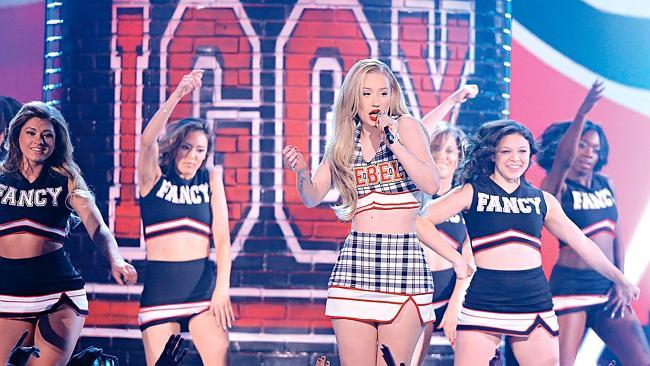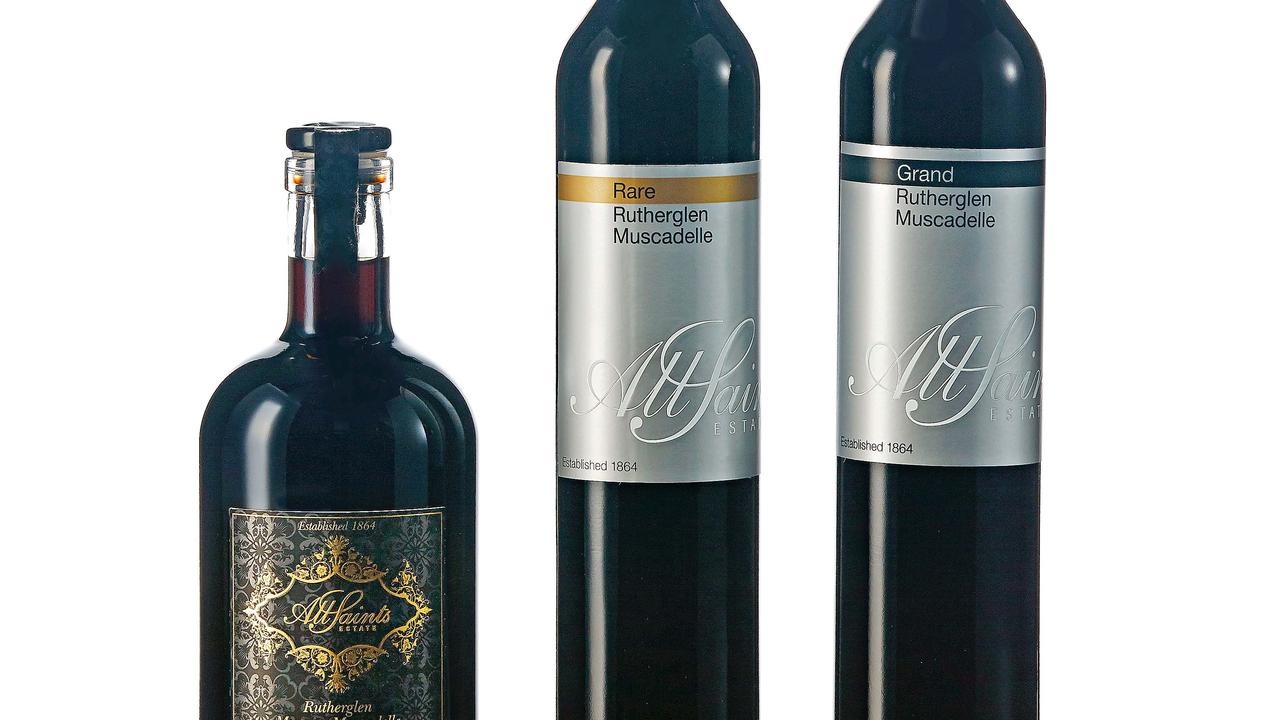How Iggy Azalea, from country NSW, became the queen of pop
HOW did a girl from country NSW become the hottest thing in American hip-hop?

IT IS late on Saturday night when Iggy Azalea, one of the hottest pop stars on the planet, enters the lobby of Manhattan’s Mondrian Soho, one of the hottest hotels on the planet. On a lush garden patio, expensively dressed couples finish up elaborate dinners while in the bar, women in this season’s Louboutins are half-dancing to a steady electro throb and fielding the attentions of well-heeled bankers. Tall and pale, wearing track shorts and dirty sneakers, her blonde hair pulled back from her face, Azalea looks like a gangly teenager who has just come home from soccer practice to find a bunch of her parents’ boozy friends in her living room. “Ugh,” she exclaims. “I forgot that it’s a f. king nightclub around here.” If you only know her from the Southern inflections of her rhymes on hits like Fancy and Ariana Grande’s Problem — the Nos. 1 and 2 singles on the US Billboard Hot 100 in early July — her starkly Australian accent is momentarily jarring.
“This is how I feel about hotels,” she says, as she settles into a dining chair in her small suite. “If mainly people under 30 stay there, I’m not interested. I want to stay in a place where 50-year-old rich people stay. It’s not that I care who’s around me — I just don’t want anyone around me. And if it’s an old rich lady, they’re usually pretty quiet and disgusted I’m even here, which I like. I want to be at the pool and nobody is at the pool — not you and all your bridesmaids.” With that clarified, she picks up the phone and orders dinner: a hamburger with extra cheese, “that weird peperonata thing on the side” and four Arnold Palmers with mint.
It’s tempting to say that this image of the party-hating, teetotalling, old-lady-loving shut-in is inconsistent with Azalea’s public persona, a short-short-wearing, expert twerker. But as a white, 24-year-old female Australian rapper, up-ending convention and defying categorisation is what defines her brand, though for a while it appeared to be what would sink her career.
Two years ago, Azalea was just another casualty of the record business, trying to turn a handful of accomplished mixtapes and press accolades into a label deal. The road to the April release of her debut album, The New Classic, has been long, but the results have been quick: The album entered at No. 3 on the Billboard 200 and at No. 1 on Rap Albums for the week ending May 4, and made it to number two on the Australian album charts. Early this month her single, Fancy, was atop the Hot 100, becoming the longest-leading No. 1 by a female rapper. And Problem, Azalea’s collaboration with Grande — who she met last November when they presented together at an awards ceremony — gave her a unique accomplishment: the first act since The Beatles to have her debut Hot 100 hits reach Nos. 1 and 2 on the chart simultaneously. (She is also the first female Australian artist to top the Billboard charts since Olivia Newton-John in 1981 with Physical.)
Azalea is aware that other people think this is a big deal, but to her, “it doesn’t mean anything,” she says, with a somewhat weary sigh. Then she smiles mischievously, seizing another opportunity to lean into her role as a rebel. “I’d rather be The Rolling Stones.”
It has been seven years since Azalea first showed up in Miami, a 16-year-old from the northern NSW town of Mullumbimby who had told her mother she was going on vacation with a girlfriend but was actually alone and not planning to return home until she had made it as a rapper. In the years that followed, Azalea ran the gauntlet of music-industry hazing, from watching a deal with a major label (Interscope) unravel to falling in love and then breaking up with another high-profile up-and-comer (ASAP Rocky) to publicly feuding with a peer (Azealia Banks) to slogging through press tours filled with questions about her status as a feminist and her favourite sexual position. Despite her youth, Azalea is already an industry veteran and has learnt to put less stock in the symbols of her success and more in the unique sound and image that fuelled it. “What does ‘new classic’ really mean?” she muses, when asked about what drives her life and her art. “For me, as a rapper, I just think whatever classic hip-hop is, the classic image of that? I don’t think that’s what it is anymore. And I am a good example of what it could look like now.”
For many, the idea that a white girl from Australia could be the new face of hip-hop is distressing. At every step of her rise Azalea has been dogged with criticism about her outsider status, accused by some of not paying enough homage to the legacy of hip-hop and by others of too casually co-opting the genre’s traditions. To her, it’s a catch-22: is she not hip-hop enough because she comes from Australia, or too hip-hop because she rhymes in an accent that’s more Atlanta than NSW? “We get so caught up, especially in rap, with what’s authentic, and I wish people would think more about what the f. k that even means,” says Azalea, glancing absentmindedly at the TV broadcasting the recent Rock and Roll Hall of Fame induction ceremony. “One critic was like, ‘Why didn’t you talk about more Australian things?’ I don’t understand why I’m supposed to write a song about living in the Outback and riding a kangaroo to be authentic.”
Azalea is full of colourfully expressed opinions. You can tell she enjoys the comic drama of getting worked up. When Lorde’s Rock and Roll Hall of Fame performance with the remaining members of Nirvana comes on the TV, Azalea blurts out, “Oh, it’s her.” There’s a long pause, then she goes for it. “Nothing against her, but I think when you’re doing a tribute to someone that’s dead, generally it should be the person’s peer,” says Azalea. “Lorde is not Kurt Cobain’s peer. No matter if she killed the performance or not, I just don’t think it’s appropriate.” (She has since said her comments on Lorde weren’t “meant as some backdoor way to take a dig at her or the performance she gave”.)
Like all aspiring superstars, Azalea — born Amethyst Amelia Kelly in Sydney, 1990 — relishes attention, whether that comes from being worshipped, disagreed with or seen as unusual, the way she was as a child. “I was always the kid that was f. king weird,” she recalls of her experience growing up with her younger sister in Mullumbimby. Her mother, Tanya, cleaned houses and encouraged her daughter’s interest in art. She told the Northern Star newspaper that the family moved to the area when Azalea was about 18 months old, living in a mud brick house built by her dad, Brendan. Her English teacher introduced her to hip-hop and her first performance was at Lismore PCYC with a breakdancing crew. “She always had the ambition to be the female equivalent of Eminem,” Tanya said. “It just goes to show if you put your mind to it, you can do anything.”
Her father worked as a landscaper but also had a career as a standup comic and played in a punk band. Now he writes children’s books with titles like The Little Runt Who Said C**t. Her parents had an unsteady relationship and eventually split. Azalea says there were several years as a child when she didn’t really see her father but they’ve since become “close in our own way”.
As the story goes, Azalea first heard Tupac Shakur’s Baby Don’t Cry when she was 11 and decided then and there to become a rapper. By 14, Azalea was writing her own raps and hanging out in one of Sydney’s two hip-hop clubs. But more than a desire to become the Aussie Tupac, Azalea was driven by broader, more classical themes: escape and reinvention. “When I first started rapping, I thought I’d move to the city [Sydney]. But when I got there I was like, ‘These people are still not my people. They’re still too practical for me. I need some real mental people to be around. I need a lot of batshit-crazy people who are completely excessive and ridiculous. I need to go to America’.”
Azalea landed in Miami in 2007, dabbling in audio engineering and pursuing her school education. The next year she moved to Houston, then Atlanta, where she lived in 2009 and 2010. It was around this time that she put online her early, attention-getting tracks like the deliciously depraved, witty Pussy, which began to earn her label attention. Still, by 2012, momentum had stalled as quickly as it built. Azalea had no record contract, no publishing deal and what she says was a sticky-fingered booking agent. She retreated to Atlanta and went in search of new management. “I didn’t want to work with a guy because they just seem to think you’re impulsive,” she recalls, “so I was like, ‘I need to find some bitches that understand me. Like, big mean bitches.’ ”
That’s when the young rapper connected to her current manager, Sarah Stennett of Turn First Artists. “I didn’t even want to meet her,” recalls Azalea. “I came to the lunch 40 minutes late in gym clothes, purely for the free food. Sarah was like, ‘What is wrong with you, luv? Are you just really rude or are you heartbroken?’ ” Azalea was, in fact, heartbroken. “I’d just broken up with my boyfriend and nobody would return my calls,” she remembers. Sarah told her, “We’re going to show them.” Then she sent Azalea to Wales over Christmas to write.
“I wanted her to get really away from all the glitz and glamour and really back to basics,” says Stennett. “It was harsh — it was very cold and very dark in deepest Wales at a very faded-glory studio, but it became a hugely important part of the process.” Stennett set up Azalea with production team The Invisible Men, whom she feels are gifted at coaxing “artist-defining” songs out of young musicians. When the Wales work began to bear fruit, Azalea and The Invisible Men continued working on tracks for nearly two years. One of the many demos they turned out, Leave It, eventually became Fancy.
“The No. 1 thing people in the music business do to make you do what they want is tell you that your life will be over if you don’t do it,” says Azalea. “They say, ‘If you f. k up, it will all be over. You’ll never have another chance. If I listened to those people I would have been the girl who had the song called Pussy and almost got a record deal and then didn’t and went back to Australia.” But she didn’t, and now she’s free. “You can’t ever again make me scared of what’s going to happen because I’ve already seen what happens — you end up in Wales and it’s fine. I’m glad I know that.”


